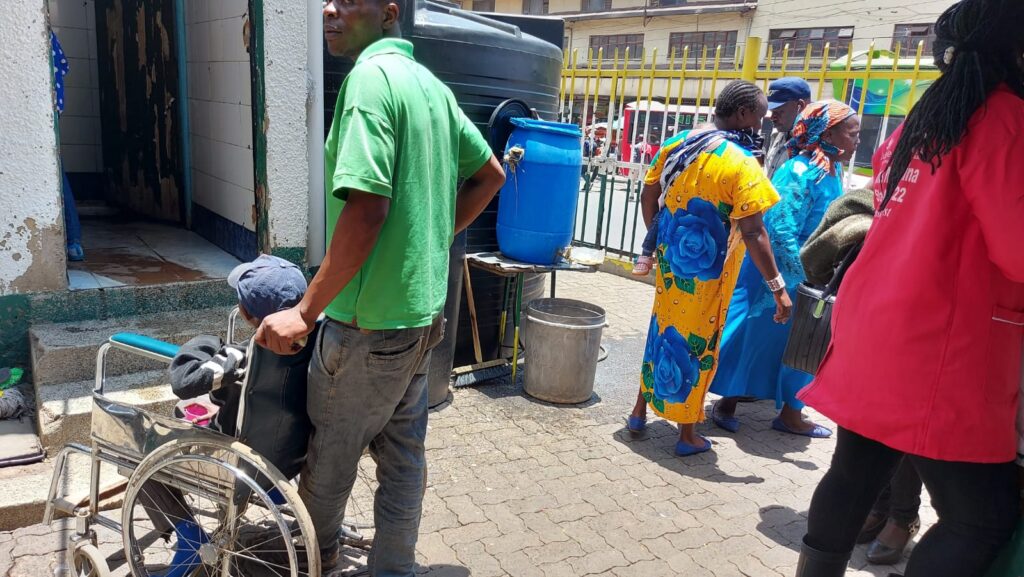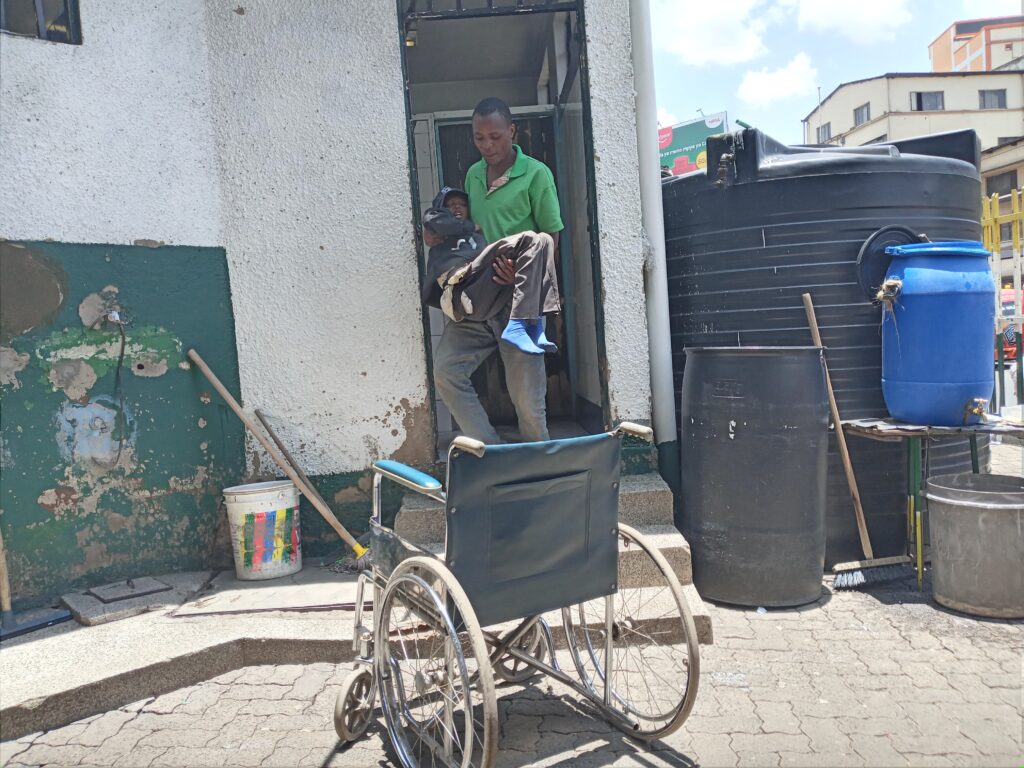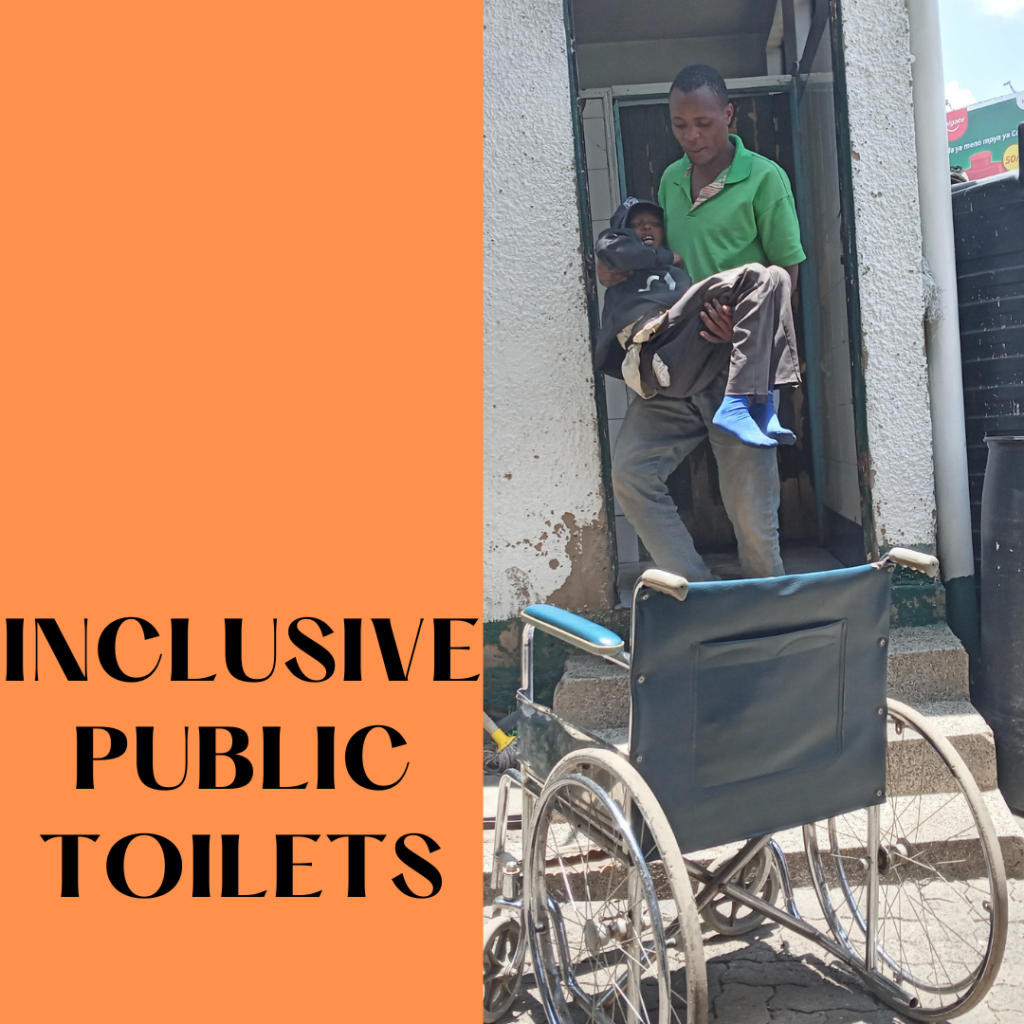Public toilets are essential in meeting the sanitation needs of the public especially when they are away from their homes or workstations. Unfortunately, access to clean and dry, well-lit, and well-maintained toilets that meet the diverse needs of the members of the public including children and persons with disabilities is not always guaranteed. As a result, sanitation and hygiene needs are more often than not compromised.
Imagine being in a city, conference or work place where you cannot access a toilet just because you are physically challenged? Is the public toilet around you inclusive and accessible to persons living with disability? How would you feel if you were forced to schedule your activities and meetings around the availability of an inclusive toilet? This was the discussion in last year’s World Toilet Day Webinar themed “Inclusive Public Toilet Design”
Every human being deserves dignity. Bright Oywaya of Association of Physically Disabled Kenya and the Executive Director of Association for Safe International Road Travel Kenya, narrates her experience as a person living with disability during the World Toilet Webinar held on November 19th 2021. Everything to do with toilet matters is private since it is done behind closed doors, but when we bring up accessible toilets for people living with disability, it becomes a matter of urgency for everyone.
Access to toilets for people living with disabilities is a challenge and most of the time they get excluded from activities. More often than not they require someone to be there with them for any assistance they might require. Ms. Bright explains how as a person living with Disability, she avoids taking any heavy food and beverages when she has to take a long journey. Casing point, when she is traveling to her home in Western Kenya, she travels via flight or private means since she already knows there are no facilities on the way that will cater to her needs. Imagine the extra cost of flights? She always has to travel with people who can shield her. Ms. Bright says that“ It takes a lot of planning which is so unnecessary and no one should have to go through all that just to access a facility that should be all inclusive.”
Having gone through a lot of inconveniences, she narrates this one scenario where she had attended a full day conference. Imagine attending a conference and you think you will find an all inclusive toilet since it is a prestigious hotel. To her surprise, this was not the case. Luckily, the hotel had rooms so they accessed one and still, the toilet couldn’t accommodate her since it was not built to accommodate anyone using a wheelchair.
More often than not, she has turned down multiple invitations to great conferences in Nairobi CBD just because she couldn’t access a toilet. In situations that she could not avoid, she would be driven all the way to Nairobi Hospital to relieve herself. Imagine enduring traffic just to go to a toilet? How much does she miss out on in conferences while searching for a facility that is a basic human right?
Ms. Bright Oywaya’s story is not different from other disabled persons in the city. Recently, Wow Mom installed a baby changing station in the OTC public toilet. While there, we experienced first hand the challenges that persons with disabilities experience while accessing public toilets in Nairobi. Since the toilet did not have a ramp, the disabled person was assisted in toileting.


Access and regular use of sanitation facilities by physically challenged people is pivotal in reducing their risk of contracting diseases associated with poor sanitation. The rights of persons with disabilities are guaranteed under The United Nations Convention on the Rights of Persons with Disabilities (CRPD). Article 9 of the convention requires all duty-bearers to identify and eliminate obstacles and barriers to accessibility to ensure that persons with disabilities access facilities and services open or provided to the public.
According to the constitution of Kenya, article 54 states that; Persons with any disabilities are entitled to
- (a) to be treated with dignity and respect and to addressed and referred to in a manner that is not demeaning; (b)to access educational institutions and facilities for persons with disabilities that are integrated into society to the extent compatible with the interests of the person; (c)to reasonable access to all places, public transport and information; (d)to use sign language, braille or other appropriate means of communication; and (e)to access materials and devices to overcome constraints arising from the person’s disability.
The National Census conducted by Kenya National Bureau of statistics (2019) highlights that 3.3% of the population are living with disabilities. The data further reveals that we have more women (2.5%) that are disables as compared to men (1.9%). Is it not time we included persons with disabilities in toilet matters?
“What you think I need might necessarily not be suitable for me. Ask me,” Bright says. We have all at one point come across an inclusive public toilet signage that but once you check, they do not have one, or it’s too small and for some, you find them locked and this begs the question, have the relevant authorities and boards fulfilled their part according to the constitution to ensure the needs of personal living with disabilities are met? Majority of the people living with disability live below the poverty line which means most of them have to do with what is provided without any complaints.
The government should plan and implement ways to cater for the needs of persons living with disabilities when it comes to toilet matters. Ensuring all public toilets are inclusive and making sure they can access it free or at a subsidized price. This can be made possible through conducting public forums where they can be able to listen to the needs and wants which will help in putting up proper and long lasting structures. They can also embrace a proper business model which can adapt the aspect of corporate social responsibility and it can be a way to get donors and investors to be part of the initiative.
As we come to an end, we should all remember that this is a basic human right. Imagine losing a source of income just because you are unable to access a toilet that caters to people living with disability? We are one accident away from disabilities which was the case with for Ms. Bright Oywaya. Upon resuming work after the accident, she was forced to resign her banking job not long after, because the bank failed to provide an inclusive toilet. As Wow Mom Kenya, we are ensuring that the baby changing stations are accessible even to caregivers using a wheelchair. However, we need to get the caregivers using a wheelchair to the public toilet first! How can we do this? Ensuring that all public toilets have ramps and functional disabled toilets in both male and female toilets.


One Response